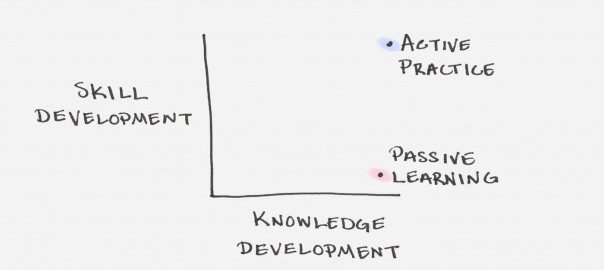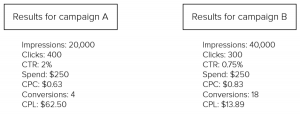We all have goals that we want to achieve in our lives. These goals may include learning a new language, eating healthier and losing weight, becoming a better parent, saving more money, and so on.
It can be easy to assume that the gap between where you are now and where you want to be in the future is caused by a lack of knowledge. This is why we buy courses on how to start a business or how to lose weight fast or how to learn a new language in three months. We assume that if we knew about a better strategy, then we would get better results. We believe that a new result requires new knowledge.
What I’m starting to realize, however, is that new knowledge does not necessarily drive new results. In fact, learning something new can actually be a waste of time if your goal is to make progress and not simply gain additional knowledge.
It all comes down to the difference between learning and practicing.
The Difference Between Learning and Practicing
In Thomas Sterner’s book, The Practicing Mind, he explains the key difference between practicing and learning.
“When we practice something, we are involved in the deliberate repetition of a process with the intention of reaching a specific goal. The words deliberate and intention are key here because they define the difference between actively practicing something and passively learning it.”
—Thomas Sterner, The Practicing Mind
Learning something new and practicing something new may seem very similar, but these two methods can have profoundly different results. Here are some additional ways to think about the difference.
- Let’s say your goal is to get stronger and more fit. You can research the best instructions on bench press technique, but the only way to build strength is to practice lifting weights.
- Let’s say your goal is to grow your startup. You can learn about the best way to make a sales pitch, but the only way to actually land customers is to practice making sales calls.
- Let’s say your goal is to write a book. You can talk to a best-selling author about writing, but the only way become a better writer is to practice publishing consistently.
Passive learning creates knowledge. Active practice creates skill.

Let’s consider three more reasons to prioritize active practice over passive learning.
1. Learning Can Be a Crutch That Supports Inaction
In many cases, learning is actually a way to avoid taking action on the goals and interests that we say are important to us. For example, let’s say you want to learn a foreign language. Reading a book on how to learn a foreign language quickly allows you to feel like you are making progress (“Hey, I’m figuring out the best way to do this!”). Of course, you’re not actually practicing the action that would deliver your desired outcome (speaking the foreign language).
In situations like this one, we often claim that we are preparing or researching the best method, but these rationalizations allow us to feel like we are moving forward when we are merely spinning our wheels. We make the mistake of being in motion rather than taking action. Learning is valuable until it becomes a form of procrastination.
2. Practice Is Learning, But Learning Is Not Practice
Passive learning is not a form of practice because although you gain new knowledge, you are not discovering how to apply that knowledge. Active practice, meanwhile, is one of the greatest forms of learning because the mistakes you make while practicing reveal important insights.
Even more important, practice is the only way to make a meaningful contribution with your knowledge. You can watch an online course about how to build a business or read an article about a terrible disaster in a developing nation, but that knowledge is unproductive unless you actually launch your business or donate to those in need. Learning by itself can be valuable for you, but if you want to be valuable to others, then you have to express your knowledge in some way.
3. Practice Focuses Your Energy on the Process
“Progress is a natural result of staying focused on the process of doing anything.”
—Thomas Sterner, The Practicing Mind
The state of your life right now is a result of the habits and beliefs that you have been practicing each day. When you realize this and begin to direct your focus toward practicing better habits day-in and day-out, continual progress will be the logical outcome. It is not the things we learn nor the dreams we envision that determines our results, but rather that habits that we practice each day. Fall in love with boredom and focus your energy on the process, not the product.
The Bottom Line
Is passive learning useless? Of course not. In many cases, learning for the sake of learning can be a beautiful thing. Not to mention that soaking up new information can help you make more informed decisions when you do decide to take action.
That said, the main point of this article is that learning by itself does not lead to progress. We often hide behind information and use learning as an excuse to delay the more difficult and more important choice of actually doing something. Spend less time passively learning and more time actively practicing. Stop thinking and start doing.
This article was originally published on JamesClear.com.
Business & Finance Articles on Business 2 Community(139)
Report Post






